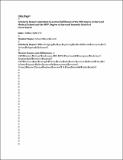| dc.description.abstract | The Syrian Civil War, one of the greatest humanitarian crises of our time, has had a particularly devastating impact on the country of Lebanon. With the influx of more than 1 million Syrians among a native population of 4.4 million, Lebanon now hosts the highest proportion of refugees worldwide. This has created a major humanitarian situation, which is now persisting into its seventh year. Funding requirements for the crisis response are high (2.75 billion USD in 2017) yet year after year are far from fulfilled. These funding gaps have led to new questions about more efficient ways to deliver humanitarian services in this protracted crisis.
This is where social enterprise fits in. Social enterprises are organizations that attempt to solve social problems through market-based principles. While traditional humanitarian funding is charity-driven, social enterprises aim for sustainability in the delivery of social services by providing services for a fee and engaging in cost recovery. We asked the following research question: Is it possible to employ a social enterprise approach to serve Syrian refugees in Lebanon as customers rather than beneficiaries?
In an attempt to answer this question, we conducted 28 interviews with members of the humanitarian response in Lebanon, as well as 2 focus groups with Syrian refugees. These meetings resulted in a wealth of information, including the following Key Findings:
Key Finding #1: Syrian refugees in Lebanon are vulnerable, and becoming more so. Our interviews and focus groups revealed a deep and pervasive vulnerability in the Syrian refugee population, exacerbated by employment restrictions. This makes it difficult for Syrian refugees to become customers in
Key Finding #2: Many donors and service providers are focused on basic assistance rather than development work. We discovered that, while most interviewees acknowledged the need for sustainability, most organizations involved in the crisis actually focus on Basic Assistance and charitable aid.
Key Finding #3: The current sociopolitical landscape does not foster the use of social enterprise. Although Lebanon has a strong entrepreneurial history, the current policy of the government towards refugees, as well as persistent local tensions, make it difficult for social enterprise to develop healthily.
Key Finding #4: There are social enterprises involved in this crisis and partial cost recovery is possible in some sectors. Despite the barriers in the previous Findings, we did find that pre-existing social enterprises had expanded services to Syrian refugees, although have had to rely on charitable funding to do so. We did, however, find some examples of cost recovery taking place, especially in the Health and Livelihoods Sectors.
Informed by these Key Findings, we provide the following Recommendations for venture philanthropists and others interested in efficient humanitarian delivery: 1.) Invest in existing social enterprises in order to help them expand to the Syrian refugee population. 2.) Look at the primary healthcare field for examples of current cost recovery and possible opportunities to scale. 3.) Explore microfinance and livelihood activities, especially ones that are currently being tolerated by the Lebanese government. 4.) Acknowledge that hybrid social enterprises (in which some money comes from donations) are still an opportunity. | |


